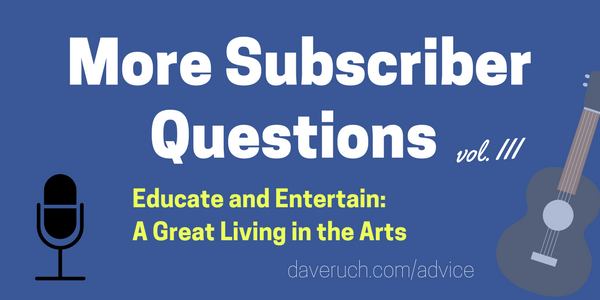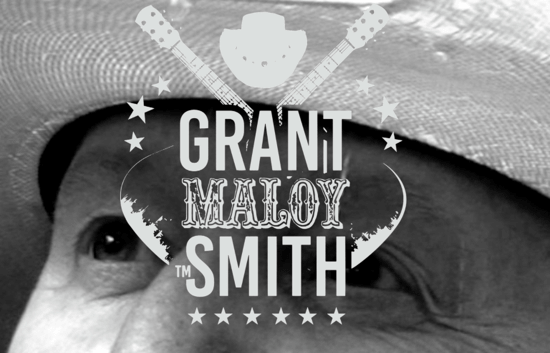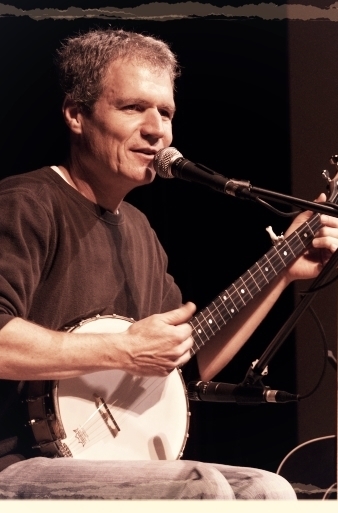I’m going to keep answering subscriber questions as long as they keep coming in – so keep ’em coming!
This time around, we cover crowdfunding, booking agents, email marketing, bios, and more…
(Not subscribed yet? Just click here and you’re in!)

#1. Email Marketing
Doug says:
“I need to get serious about email/marketing. I’ve been putting it off as my musical partner and I are headed to Memphis in January for the IBCs, but I need to get to it.”
I guess I’d need to know more about what you’re doing already Doug, but in general, email can (and arguably should) be the central “hub” in your efforts to generate bookings.
You could get off to a solid start by reading the following articles, in roughly this order…
A Free Email Marketing Crash Course!
- Marketing 101 for Performers
- What Do You Do When You’re NOT Performing?
- More Gigs: A Challenge
- No Reply: Why Don’t Venues Get Back to Me?
- Email Subject Lines That SUCK!
That should keep you busy for quite a while, and if you commit to applying those concepts and suggestions, you’ll be way ahead of the game.
I also have a jam packed 80-minute video course on the subject, which is available for a fee at the How to Book Gigs Through Email Marketing page.
#2. Booking Agents
Grant said:
“My main challenge is finding a really good booking agent.”
From what I’ve heard, this seems to be a challenge for a whole lot of performers.
I’m sorry to say I know nothing about the subject Grant, as I’ve always booked myself.
But, hey, everybody – check out Grant Maloy Smith and book him for something!

(Anybody with booking agent advice for Grant – please post in the “Comments” section below…)
#3. Ads on Google and Facebook, Mailings, Emails, Newsletters – Help!
Robert was saying:
“Besides receiving your emails, I belong to a couple of Facebook groups: School Show Performers and Marketing for Entertainers. Most of the people who post things seem to be magicians, which is a different field from mine (puppeteer), and many seem to perform at birthday parties (I don’t). Still, I read interesting information. The problem is some rely heavily on emails and ads on Facebook and Google, newsletters, drip campaigns, and others still rely on mailings. There are so many variables – one being that different parts of the country are more prosperous than others, and more invested in the arts than others. It’s a lot to decipher. Maybe you’d like to address this from time to time.”
And Paul had a similar question, asking about:
“How to most effectively market online, Facebook or not.”
First of all, thanks Robert for letting me know about those two FB groups. I joined both of them!
The question is a good one, and as you mention, every situation (and geography) is different. All we can do is try, test, experiment, and adjust as we discover what’s going to work best for us.
I can tell you quickly how I think of each of the channels you mentioned:
Email – love it, use it all the time to book gigs (see Doug’s question above)
Facebook ads – have used them extensively. Good for reaching people who are already “warm” to what you do (past website visitors, customer list, etc), and for finding new audiences who might be future clients (using interest and page targeting, etc). I’ve almost NEVER booked a gig as a direct result of a FB ad though.
Google ads – if what you do is something that people are regularly searching online for (“wedding bands Detroit,” for instance), then these can be a great idea. NOBODY really searches for what I do, so I don’t use paid search ads very much. With a Google ad, you are essentially buying yourself a position toward the top of Page 1 in the search results. Very valuable for certain types of performers.
Email newsletters – I think these were more valuable 10+ years ago when they were a bit more rare. Then we all started getting bombarded with the monthly “email news” of every organization we’d ever interacted with, and it just became overwhelming and lost any real benefit from a marketing perspective. That said, an occasional newsletter to a targeted list of people who have hired you in the past, or expressed an interest in your services, can still be a great idea. Just make sure you’re not simply droning on about yourself and your latest “news” – remember to always think about what’s in it for them? (Your reader doesn’t care that much about what you’ve been up to.)
Drip campaigns – for those unfamiliar with the term, this is an automated sequence of (usually) emails designed to keep a contact engaged and perhaps lead them towards a booking (drip….drip….drip….). Perhaps someone signed up for your list at a booking conference, or filled out a form online to get a price quote. These take a LOT of engineering to do successfully in my experience, and unless you’re generating hundreds of “leads” online each month, this might not be the place to put a ton of energy. Depends on your situation, of course.
Physical mailings – I think you and I have discussed this before in a coaching call or via email Robert, but I do think there’s room for the US Mail once again in our promotional efforts, and would love to hear from anyone who is doing this. Direct mail reached a saturation point in the 1990s and early 2000s, and then we all got hot on email. Now, it seems that most marketing messages are delivered online. Perhaps we can stand out again in the snail mailbox of 2018.
#4. Bios and Publicity Blurbs
Patricia said:
“I’d like to see the best three publicity blurbs to have in your repertoire – Program (50 words or less), Announcement of event (a little longer), and Interview (the longest of all).”
Patricia – done! I was just recently discussing the components of a strong bio with another subscriber, and thought this would make a great topic for a full-length article.
And now you’ve inspired me.
So, here it is.
#5. Kickstarter CD Campaigns
Both Paul (from above) and Jamie Savage were asking about:
“How to successfully prepare and conduct a Kickstarter CD campaign.”
I’ve never done a crowdfunding campaign for any of my projects, so I went to my trusted sources for well written, authoritative advice and found the following articles.
Give these a try – you can’t go wrong with these two blogs:
From Bandzoogle blog
From CD Baby’s DIY Musician blog
Hope that helps! More next week…
[optin-monster-shortcode id=”xa8rwoht0w0toxrrvzy2″]
About The Blog
 Since leaving a white-collar marketing job in 1992, Dave Ruch has been educating and entertaining full-time in schools, historical societies and museums, folk music and concert venues, libraries, and online via distance learning programs.
Since leaving a white-collar marketing job in 1992, Dave Ruch has been educating and entertaining full-time in schools, historical societies and museums, folk music and concert venues, libraries, and online via distance learning programs.
Along the way, he’s learned a great deal about supporting a family of four as a musician.
The Educate and Entertain blog provides articles, tips, encouragements, and how-to’s for regional performers (in any region) interested in making a great full-time living in the arts.


Hi Dave,
I always look forward to reading these subscriber question posts. Thanks for doing them!
I have a couple of thoughts on this one:
1. Agents will want to work with you if – and only if – a) you have already proven that you can book yourself and b) you are a full-time musician.
That isn’t a criticism of agents in any way; I’d use the same criteria if I were an agent. If you don’t meet both criteria, Dave’s columns are filled with great advice on DIY booking!
2. Email newsletters are definitely not dead. On the other hand, boring email newsletters filled with “me, me, me, blah, blah, blah” are very dead. I know several artists that send out regular creative, well-written email newsletters that give value to the reader and are totally engaging to read. (ahem, kind of like your emails Dave…)
Thank you, Dave… I always look forward to the Monday emails!
Excellent points, Michael!
Hi Dave,
Often times when I send out an introductory email, I’ll get a response back that says something like “I forwarded your info to the committee, activities director, assembly coordinator.” I’m sure you’ve encountered the same problem as well. How do you handle this? This gets a bit tricky when it comes to follow ups. I’ve tried responding back with statements such as “should I follow up with you or someone else?” I’ve also tried asking them for the booker’s contact info. Haven’t had any luck with either of these strategies. I think they’re reluctant to give out contact info due to the fact that they think you’ll start bombarding them with emails, phone calls, mailings. Your thoughts.
I don’t have any kind of good answer for you. I always just follow up with the person who initially made the inquiry, and often try to work in a new incentive to book something, i.e. “I’ve now got a show about an hour away from you on the evening of XYZ….would you be interested in a discounted performance that afternoon?” Of course, I only do that when I have a legitimate booking I can piggyback on, but that’s an excellent way to get a quick and positive response.
For booking gigs at nursing homes, I’ve started mailing out letters that say who I am and direct them to a promo video on my website. I’ve heard back from about 20% of them and booked every place that called or emailed me. It’s very hard to find email addresses for the activities directors, so mail was the way to go.
Also tried mail for contacting catering directors of hotels and country clubs, but that hasn’t been successful.
Thanks for jumping in here to share your experiences Nate!
Hi Dave –
Regarding Grant’s inquiry about booking agents – I’m on the same wish list, and have been for some time. Gosh it would be great to have the burden of booking, promoting, and some of the other hats besides writing and performing lifted off in some capacity. From what I’ve been told by several booking agents, and venues presenters is this – you already have to be making at least 50K per year, and siginificantly built an audience to retain the services of a booking agent. The days of someone putting in the “sweat equity” and having faith in an artist from the ground up, are kind of long gone. Not unlike record companies, agents want the artists to do all the work of building, and once you’ve established yourself on your own, they’re more likely to want a piece of what you’re doing.
Thanks for this Dave. Not surprising at all.
This is very helpful — although potentially quite overwhelming, too. I visited several links and began the process of learning HOW MUCH I am totally ignorant about… Thank you for these ideas and links.
It’s pretty much never ending, isn’t it Will? So much we can be doing to keep our calendars full (and so little time…)
I’d love to know if anyone has done a crowdfunding project. It seems to be, in the kindie realm especially, a lot of artists I’ve talked to have not gone this route. I don’t know if that’s a generational thing (Dave I am not calling you old! HA) or what but it seems that most stay away from it.
I’ve always been on the fence with it. On the one hand it could REALLY help me fund a project and make something really great. On the other hand, you’re asking friends/family/strangers to give you money so you can make something…that will make you money. Then there’s the whole incentive part of it. What does one “give” backers?? Especially, for someone like myself who is still very new in this field, am I am even in a position to ask for that level of support???
Thoughts anyone??
Nathan – I am indeed “old!,” and since I’ve never done a crowdfunding campaign, I don’t have much of value to contribute here, but I would give you this to think about – your friends and family WANT to support you, and sometimes the asking is the hardest part. I wouldn’t pitch it as something that’s going to “make you money” (it very well may NOT be), but as a stepping stone in your career – a move that will help get you to the next place. “A new CD so that I can (fill in the blank – apply to festivals, or start to get my songs heard on kids radio, or ….)”
Your fans, friends and family will want you to make that step.
Dave Rowe (Folk Musician) funded a successful kickstarter for a new CD, and I thought he used an interesting incentive for people to take part. He wanted the money to pay other musicians to play on his CD, because musicians are so rarely fairly compensated for their hard work. As I recall, it really garnered support from music lovers, his fans, and fellow musicians alike. It funded very quickly. I think it got more shares and and attention because it was a righteous cause. I post the historical link to it here so you can see what he gave to backers as well. Good Luck!
https://www.kickstarter.com/projects/daverowemusic/dave-rowes-new-solo-recording-project/description
Love it Stace, thanks for sharing that.